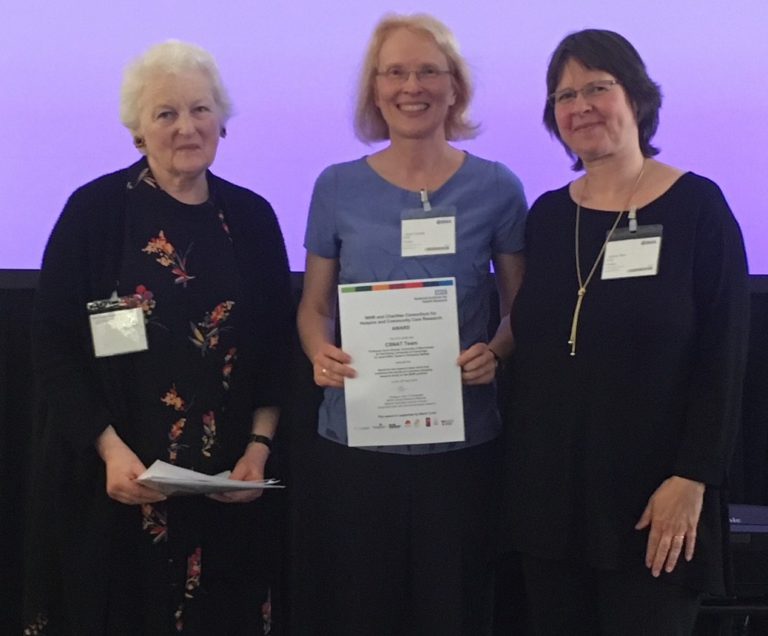Carer support tool wins national award
A team supported by CLAHRC Greater Manchester has won a major national research award for its work on a Carer Support Needs Assessment Tool (CSNAT) intervention.
The award, given for the publication of practice-changing research within the NIHR (National Institute for Health Research) portfolio, was announced at the NIHR Charities Consortium Conference for Hospice and Community-based Research.
CSNAT is an intervention to improve support for family carers and was originally developed for carers of palliative patients living at home who were mostly cancer patients. Trials have shown it to be of benefit to carers in this context. Its use is now being explored for carers of people with other life-limiting conditions such as stroke, dementia and motor neurone disease.
The CSNAT is also starting to be used in settings other than home care. For instance the tool is being used in hospital outpatient clinics, and one primary care trust is working on rolling out the CSNAT approach to all GP practices in Cambridgeshire and Peterborough as part of their ‘family prescription’ for carers.
 International
International
The CSNAT team consists of Professor Gunn Grande from The University of Manchester, Dr Gail Ewing, Senior Research Associate at the Centre for Family Research at the University of Cambridge, and Dr Janet Diffin, Research Fellow at Queen’s University Belfast.
Prof Grande said the tool was now also being widely used internationally. “The work of the CSNAT programme has been taken up in research and practice in other countries and there are currently a number of research trials taking place internationally involving the CSNAT approach. In each of these the UK research team has provided CSNAT training materials and advice on implementation in practice.”
For instance in Western Australia a trial has been completed using the CSNAT intervention to support carers after discharge. It found the intervention improved carers’ preparedness for caregiving, with smaller but significant reductions in strain and distress. Two further evaluations of the CSNAT are also ongoing across Europe, one in Austria and Germany, and the other in Sweden.
She added that the implementation of the CSNAT approach has shown that successful adoption of evidence-based practice needs to be addressed not only at the individual practitioner level, but that organisational structures and processes need to be in place to enable this to happen.
“This is particularly crucial when working with family carers,” she adds. “The ethos of palliative and end of life care services is one of being there for the family, not just the patient. While this is a strong philosophy, many factors hinder its translation into practice. Carers are not routinely identified, systems are set up to record patient data but not carer data, and carers’ support needs are not consistently assessed or addressed.”
Intervention
The CSNAT intervention comprises two components. Firstly, an evidence-based, comprehensive support needs assessment tool, and secondly a defined five stage person-centred process. Together this enables a holistic and systematic process of assessment and support that is carer-led and tailored to carers’ individual needs.
Prof Grande said the collective research studies around CSNAT represent a robust programme of work which has involved more than 1500 carers and 500 practitioners, while the programme has also delivered training workshops to more than 90 healthcare organisations.
With funding from Hospice UK and CLAHRC-GM, the academics have also just completed a substantial project examining what is required within organisations to achieve comprehensive, person-centred assessment and support for family carers towards the end of life.
The NIHR Charities Consortium was launched in 2017 to bring together the NIHR Clinical Research Network and a wide range of UK charities to support supportive and palliative care research in the hospice and community settings. The Consortium aims to make the UK a global leader in the area of hospice and community research within five years.
You can view a copy of the presentation Prof Gunn Grande gave at the awards here.
Date Published: 12/06/2018